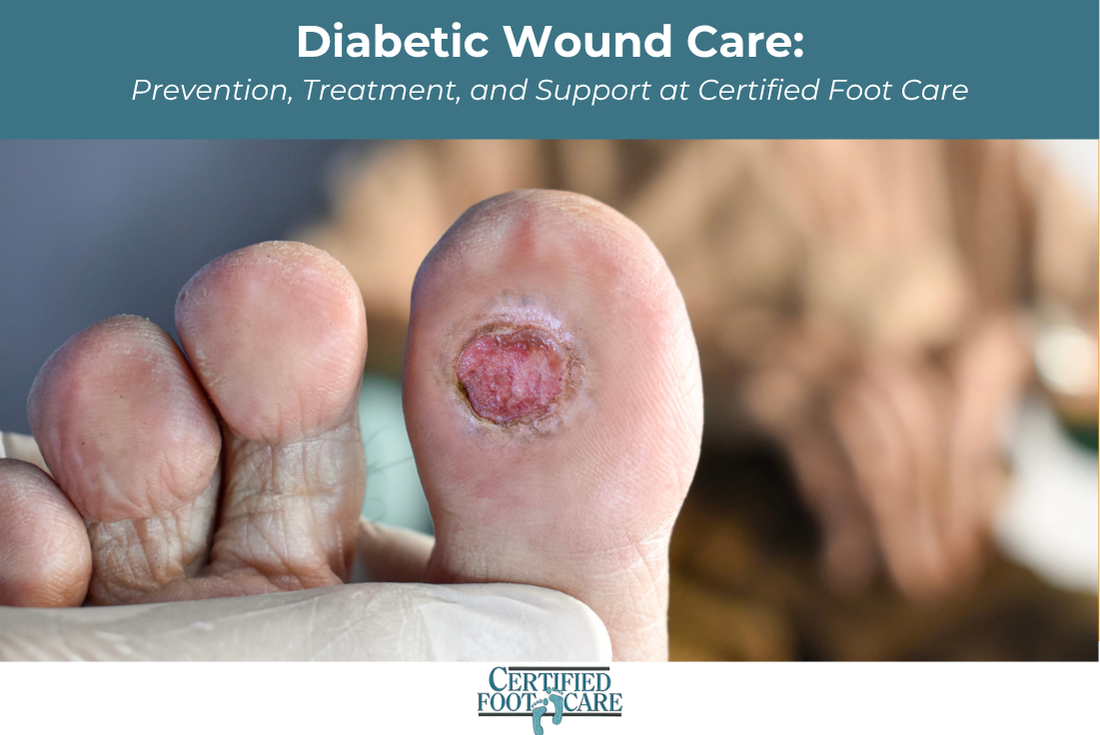 Serving Larchmont and Brooklyn, NY
Serving Larchmont and Brooklyn, NY
certifiedfootcare.net
For individuals living with diabetes, foot health is a critical part of overall wellness. One of the most serious complications associated with diabetes is the development of foot ulcers and wounds, which, if left untreated, can lead to infections, hospitalizations, or even amputation. At Certified Foot Care, we specialize in comprehensive diabetic wound care to help patients prevent complications, promote healing, and maintain mobility.
Understanding Diabetic Wounds
People with diabetes are more prone to foot wounds due to a combination of nerve damage (neuropathy) and poor circulation (peripheral arterial disease). These conditions reduce sensation in the feet and slow the healing process, making even minor injuries dangerous if they go unnoticed or untreated.
A small blister, cut, or scrape can quickly turn into a chronic wound or ulcer. That’s why proactive diabetic foot care and prompt treatment are essential.
Our Diabetic Wound Care Services
At Certified Foot Care, we provide advanced, patient-centered wound care that includes:
1. Wound Assessment and Monitoring
Each wound is evaluated for size, depth, infection, and blood flow. We use diagnostic tools and clinical expertise to determine the severity of the wound and create a personalized care plan.
2. Debridement
We carefully remove dead or infected tissue from the wound to promote healing and reduce the risk of infection.
3. Infection Control
Bacterial infections are a leading cause of complications. We offer on-site cultures and targeted antibiotic therapies to stop infections before they spread.
4. Advanced Wound Dressings
We use specialized dressings that create an optimal healing environment—moisture-retentive, antimicrobial, or absorptive depending on the wound’s needs.
5. Offloading Techniques
To reduce pressure on the wound site, we offer custom orthotics, diabetic shoes, and total contact casting—essential tools for healing foot ulcers.
6. Vascular Assessments and Referrals
If poor circulation is a contributing factor, we coordinate vascular testing and surgical consultations as needed.
Prevention is the Best Medicine
Diabetic wound care isn’t just about treating wounds—it’s about preventing them. Here are a few proactive steps every diabetic patient should take:
- Daily foot inspections for cuts, swelling, or color changes
- Proper foot hygiene, including washing and moisturizing (but not between toes)
- Wearing well-fitting shoes with no seams or pressure points
- Keeping blood sugar levels controlled
- Scheduling regular foot exams with a podiatrist
At Certified Foot Care, we work with you to build a long-term strategy to reduce your risk of wounds.
Why Choose Certified Foot Care?
With offices in Larchmont and Brooklyn, Certified Foot Care is dedicated to excellence in diabetic foot health. Our experienced team of podiatrists and wound care specialists provide compassionate, individualized care backed by the latest in medical technology.
We understand how frightening and overwhelming diabetic wounds can be—but you don’t have to manage them alone. We’re here to help you heal and stay healthy.
Frequently Asked Questions (FAQ)
Q: How do I know if a wound needs medical attention?
A: Any wound that doesn’t begin to heal within a few days, shows signs of infection (redness, pus, warmth), or becomes painful should be seen by a foot specialist immediately. For diabetics, even minor wounds should be evaluated promptly.
Q: Can I treat a diabetic wound at home?
A: While basic first aid is important, diabetic patients should never rely solely on home care. Wounds can worsen quickly without professional treatment, even if they appear small or painless.
Q: What are the risks of untreated diabetic foot wounds?
A: Untreated wounds can lead to serious infections, gangrene, and, in severe cases, amputation. Early and consistent treatment is the best defense against complications.
Q: Will my wound ever fully heal?
A: Most diabetic wounds can heal with proper treatment and compliance. However, healing time varies depending on factors like blood sugar control, circulation, and the presence of infection.
Q: How often should I visit a podiatrist if I have diabetes?
A: At minimum, diabetic patients should have a comprehensive foot exam once a year. More frequent visits may be recommended if you have existing foot problems or a history of ulcers.
Contact Certified Foot Care Today
Don’t wait for a wound to become a crisis. If you have diabetes, preventive foot care and early intervention are essential. Schedule your visit with our expert podiatry team today:
📍 Larchmont Office
2365 Boston Post Road, Suite 200
Larchmont, NY 10538
📞 (914) 834-0111
📍 Brooklyn Office
474 Bay Ridge Pkwy
Brooklyn, NY 11209
📞 (917) 965-4800
🌐 Visit us at certifiedfootcare.net
Take the first step toward healing—your feet deserve expert care.
